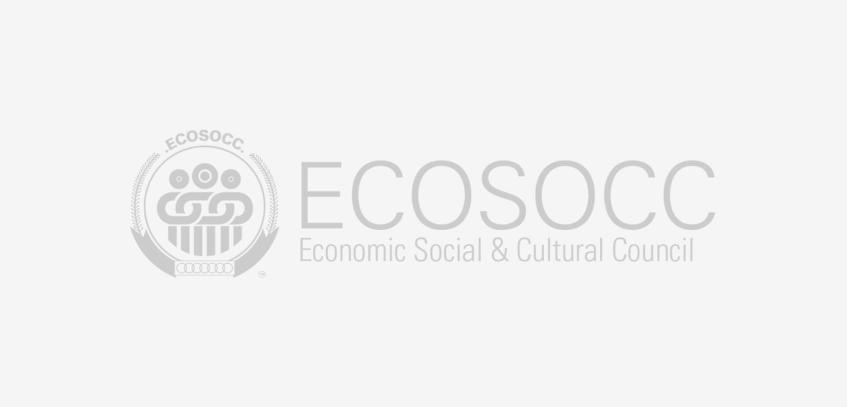The Economic Cultural and Social Council (ECOSOCC) in collaboration with the African Union’s Political Affairs, Peace and Security (PAPS) department, and the Common Market for Eastern and Southern Africa (COMESA), convened a coordination meeting with civil society organisations (CSOs) to enhance civil society engagement in the implementation of the African Peace and Security Architecture (APSA). The three-day multi-stakeholder’s forum engaged key actors from the AU, Regional Economic Communities/Regional Mechanisms (RECs/RMs), and civil society organisations from 06-08 of July 2023 to foster dialogue and enhance the engagement of CSOs in the European Union Fourth Support Programme to the APSA IV.
The EU APSA IV is a significant framework for promoting peace and security across the African continent. Acknowledging the crucial role that CSOs play in advancing the objectives of the APSA IV Programme, the coordination meeting focused on identifying strategies to strengthen CSOs participation in the APSA and fostering greater collaboration among AU PAPS, ECOSOCC, and CSOs. CSOs face ongoing challenges in engaging with policymakers and decision-makers in the peace and security domains, limiting their participation in AU and RECs/RMs initiatives. Insufficient knowledge of existing frameworks, lack of training opportunities, limited resources, and coordination gaps among implementing entities contribute to these challenges. To overcome these obstacles, there is an immediate requirement for transformative actions from continental and regional institutions. It is essential that these initiatives recognize the potential impact of enhancing CSO capabilities in peace and security, fostering a more comprehensive approach to conflict prevention, management, resolution, and peacebuilding in Africa.
Officially opening the meeting, Ambassador George Kwanya, Deputy Head of Mission, Permanent Mission of the Republic of Kenya to Ethiopia and Permanent Representative to the African Union, emphasised the importance of seizing the opportunity presented by the meeting to strengthen the role of CSOs in the implementation of the EU APSA Support Program. He acknowledged the valuable contributions of CSOs, including facilitating dialogue and negotiations, raising awareness about conflict causes and consequences, monitoring potential conflicts and security threats, and providing humanitarian assistance to conflict-affected areas.
Ambassador Kwanya pointed out that ECOSOCC's implementation of EU APSA further underscored the crucial role of CSOs in advancing peace, security, and stability in Africa.
He further acknowledged the challenges and obstacles that persist. To address the issues, he highlighted the need to develop strategies that strengthen capacity and inclusivity of civil society engagement, promote multi-stakeholder dialogue, and integrate their perspectives into APSA activities. He concluded by reiterating Kenya's commitment to collaborating and accelerating actions towards enhancing civil society engagement in advancing peace and security in Africa
Mr. William Carew, Head of the ECOSOCC Secretariat, emphasized the importance of collaboration and harmonisation of efforts to achieve the objectives of AU Agenda 2063, particularly in the areas of good governance, democracy, human rights, justice, the rule of law, and peace and security in Africa. While acknowledging the challenges faced by CSOs in engaging effectively with policymakers and decision-makers in the peace and security domains, Mr, Carew stressed the need for radical and transformative initiatives to bolster the capacities of CSOs in peace and security, including improving their knowledge of existing frameworks, providing training and capacity development opportunities, and ensuring adequate allocation of resources. He also expressed ECOSOCC's commitment for a symbiotic working relationship with AU PAPS and emphasised the role of ECOSOCC in developing advisories for policy consideration.
Ambassador Salah Hammad, Head of the AGA/APSA Secretariat, commended the delegates for their unwavering commitment to strengthening collaboration between CSOs and the AU in advancing peace, security, and good governance in Africa. He emphasised the indispensable role played by CSOs in shaping and implementing peace and security initiatives, considering their valuable insights and connections with local communities. Ambassador Hammad acknowledged the challenges faced by CSOs and highlighted the opportunity provided by the EU APSA IV program to reinforce CSO capacities and empower them to actively contribute to the implementation of the APSA and emphasised the importance of their expertise and recommendations in shaping future actions.
Ms Elizabeth Mutunga, Head of Governance, Peace and Security, emphasised the importance of enhancing the capacity of civil society to play a larger role in the implementation of the APSA-Support Programme. Ms Mutunga recognized the efforts of the Regional Economic Communities (RECs) in involving civil society in addressing conflicts and insecurity. Notwithstanding, she acknowledged that further endeavours could be undertaken to achieve even more favourable outcomes. She highlighted the collaboration between COMESA, ECOSOCC, and the African Union Commission in developing a joint program under the EU APSA Support Programme to draw synergies and maximise resources.
Mr Robert Phiri, Deputy Presiding Officer of the ECOSOCC General Assembly, underscored the significance of fostering stronger partnerships, stressing that the coordination meeting would reinforce delegates’ commitment to strengthening collaboration among all stakeholders involved in EU APSA IV. He recognized the unique perspectives and grassroots knowledge that CSOs bring, highlighting their vital role in achieving sustainable peace and development.
The coordination meeting provided a platform for participants to engage in dynamic discussions, sharing their experiences, challenges, and best practices related to civil society involvement in peace and security initiatives. More so, the meeting depicted the importance of CSO engagement in amplifying community voices, ensuring inclusivity, and promoting sustainable peace in Africa. As such, the discussions centred around reviewing the existing level of CSO engagement in the EU APSA IV program, while also considering the paradoxical opportunity presented by the challenges and barriers faced by CSOs. The deliberations culminated in the development of comprehensive recommendations aimed at addressing the identified obstacles, with the ultimate objective of mainstreaming civil society’s engagement in EU APSA IV.
The coordination meeting yielded key outcomes that encompassed strategies to fortify collaboration among ECOSOCC, AU PAPS and CSOs, ensuring their meaningful involvement at all levels of decision-making and implementation processes.





